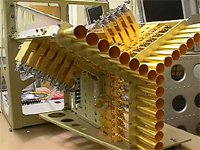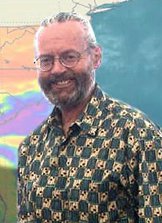Projects
GeoSTAR

The Geostationary Synthetic Thinned Aperture Radiometer, GeoSTAR, is a new concept for a microwave atmospheric sounder intended for geostationary satellites such as the GOES weather satellites operated by NOAA.
A small but fully functional prototype has recently been developed at the Jet Propulsion Laboratory to demonstrate the feasibility of using aperture synthesis in lieu of the large solid parabolic dish antenna that is required with the conventional approach.
Spatial resolution requirements dictate such a large aperture in GEO that the conventional approach has not been feasible, and it is only now, with the GeoSTAR approach, that a GEO microwave sounder can be contemplated. Others have proposed GEO microwave radiometers that would operate at sub-millimeter wavelengths to circumvent the large-aperture problem, but GeoSTAR is the only viable approach that can provide full sounding capabilities equal to or exceeding those of the AMSU systems now operating on LEO weather satellites and which have had tremendous impact on numerical weather forecasting.
